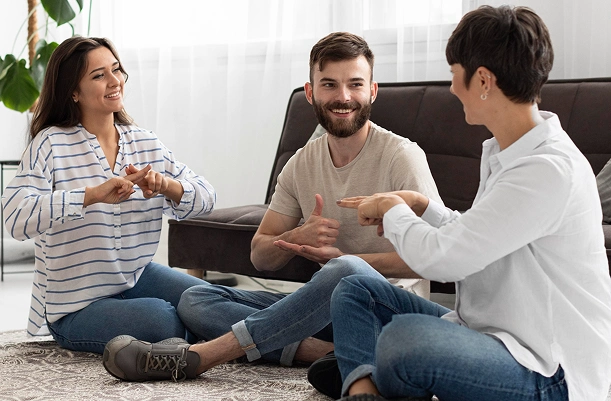Get weekly notifications for new group therapy session times.
Are you interested in joining an online group therapy session? Subscribe and receive weekly updates for new group therapy session times at Grouport.
.png)
Learn DBT Skills In A Group
Weekly sessions are available. Grouport offers therapist-led dialectical behavior therapy skills groups online. The first 12 weeks covers fundamental DBT skills.
Learn more
Relationship therapy offers couples a structured space to explore challenges, improve communication, and strengthen their emotional connection. By engaging in couples therapy through Grouport, partners can better understand each other's needs, work through conflicts, and develop strategies to maintain a healthy relationship over time. Finding the right therapy style is essential because every couple faces unique dynamics and challenges. Choosing an approach that aligns with your relationship goals ensures that the support you receive is effective and meaningful. Whether you are seeking to resolve ongoing conflicts or enhance intimacy, understanding the various therapy styles can guide you toward the most suitable path for your partnership.
Relationship therapy, also known as Couples Therapy, is a type of counseling that focuses on improving the connection between partners. Its main purpose is to help couples navigate challenges, enhance communication, and foster a deeper emotional bond. Through Grouport, couples can access professional guidance online, making it easier to engage in therapy from the comfort of home. Unlike individual therapy, which centers on personal growth and self-reflection, relationship-focused therapy addresses issues that affect both partners and the dynamics of the relationship.
Key differences between individual therapy and Couples Therapy include:
Choosing the right approach matters because each therapy style offers unique tools and techniques. A style that fits the couple’s specific needs can lead to more effective outcomes and lasting improvements in the relationship. Considering factors such as communication patterns, emotional connection, and goals helps ensure the chosen therapy approach is the best fit.
Emotionally Focused Therapy, often abbreviated as EFT, is a structured approach to couples therapy that focuses on understanding and transforming emotional responses within a relationship. The primary goal of Emotionally Focused Therapy (EFT) is to help partners recognize negative patterns and create secure, lasting emotional bonds.
EFT helps couples identify and express their emotions by:
The benefits of Emotionally Focused Therapy (EFT) for building secure attachments include:
By focusing on emotions as the key to connection, EFT provides couples with practical tools to understand each other better and foster a more resilient and fulfilling partnership.
Cognitive Behavioral Therapy (or CBT) is a widely used approach in couples therapy that focuses on identifying and changing negative thought patterns that can harm a relationship. By addressing these thoughts, CBT helps partners understand how their beliefs and perceptions influence emotions and behaviors, creating a more positive and supportive environment.
CBT addresses negative thought patterns in relationships by:
Techniques used in Cognitive Behavioral Therapy for couples to improve communication and problem-solving include:
Cognitive Behavioral Therapy offers couples practical tools to manage conflict, reduce stress, and strengthen their connection. By changing thought patterns and behaviors, partners can build healthier, more resilient relationships over time.
Couples therapy and couples counseling are often used interchangeably, but they have distinct approaches and goals. Understanding the difference can help couples choose the right type of support for their relationship. Through Grouport, couples can access professional guidance online, making it easier to find the approach that fits their needs.
The differences between therapy and counseling include:
Both approaches offer valuable support, and selecting the right option depends on the unique needs of your relationship and the goals you wish to achieve. Grouport makes it easy to connect with licensed professionals who can guide you toward the right path for your partnership.

Discernment counseling is a specialized form of support designed for couples who are uncertain about the future of their relationship. It helps partners gain clarity and make informed decisions about whether to continue the relationship, commit to therapy, or consider separation.
Discernment counseling helps couples decide the next steps in their relationship by:
Ideal situations for discernment counseling include:
Discernment counseling offers couples a practical way to evaluate their relationship and take thoughtful steps forward, ensuring decisions are made with understanding and mutual respect.
Couples therapy involves a variety of techniques designed to improve communication, resolve conflicts, and strengthen emotional connection. Therapists use specific methods based on the needs of the couple and the style of therapy being practiced.
Common techniques used by couples therapists include:
Techniques can vary depending on the therapy style:
By incorporating these techniques, couples therapy helps partners build stronger, healthier relationships and develop skills that extend beyond the therapy sessions.
Couples therapy exercises are practical activities designed to strengthen communication, build trust, and enhance emotional connection between partners. Many exercises can be done at home, allowing couples to practice skills learned in therapy and reinforce positive patterns in their relationship.
Practical exercises to strengthen your relationship include:
Benefits of integrating exercises between therapy sessions include:
By practicing these exercises at home, couples can make steady progress and create a stronger foundation for a healthy, lasting partnership.

Conflict is a natural part of any relationship, but resolving it constructively is essential for maintaining trust and emotional connection. Couples who develop strong conflict resolution skills can address disagreements effectively without damaging the relationship.
Key skills taught in therapy include:
Different therapy styles approach conflict resolution in unique ways:
By practicing these skills, couples can navigate disagreements with respect and cooperation, ultimately strengthening their relationship and promoting long-term stability.
Choosing the right couples therapist is a crucial step in ensuring that therapy is effective and supportive. Through Grouport, couples can easily connect with licensed professionals who provide guidance, practical tools, and a safe space to explore challenges and strengthen their relationship.
Tips for choosing a qualified therapist include:
Questions to ask before booking a session:
Key considerations when selecting a therapist:
By carefully selecting a couples therapist through Grouport who meets these criteria, partners can engage in therapy with confidence and maximize the benefits of their sessions.
Selecting the right therapy style is essential for improving a relationship and addressing unique challenges. Through Grouport, couples can connect with licensed therapists who guide them in choosing the approach that best fits their partnership. Emotionally Focused Therapy (EFT) helps couples explore emotions and strengthen attachments, while Cognitive Behavioral Therapy (CBT) focuses on changing negative thought patterns and improving communication. Couples therapy, counseling, and discernment counseling provide guidance for conflict resolution and clarity when the future feels uncertain. Practical exercises like active listening, journaling, and trust-building support growth between sessions. Assessing your relationship needs and consulting a licensed therapist through Grouport ensures you gain the tools to build a stronger, healthier connection.
At Grouport, we’re committed to helping you navigate your relationships with evidence-based mental health care that fits your unique needs. Whether you’re exploring therapy for couples, emotional regulation, or personal growth, our online services provide convenient, affordable access to professional guidance. From Cognitive Behavioral Therapy (CBT) to specialized approaches for anxiety, PTSD, and OCD, our programs equip you with practical tools to improve communication, strengthen connections, and foster lasting positive change, all from the comfort and privacy of home.
Whether you’re looking to strengthen your relationship, improve communication, or address personal challenges, Grouport offers convenient, research-backed online therapy options designed to fit your needs. Our structured programs, including Cognitive Behavioral Therapy (CBT), help individuals and couples build emotional awareness, develop practical coping strategies, and make meaningful progress all from the comfort of home.
We offer DBT group therapy online to improve emotion regulation, distress tolerance, mindfulness, & interpersonal skills. Get effective and affordable treatment.
Space is limited, so reserve your seat today.
You May Also Like
